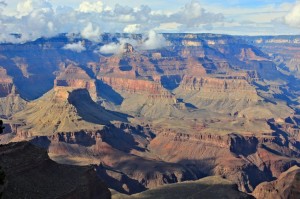Between a Creationist’s Rocks and a Hard Place
 The Grand Canyon
The Grand Canyon A creationist just sued the US Department of the Interior and won. Andrew Snelling, is a geologist (awarded a PhD by the University of Sydney in 1982) and the director of research at Ken Ham’s Answers in Genesis who agreed to drop his religious discrimination lawsuit against the National Park Service (NPS) upon approval of his research request to study rocks from the Grand Canyon.
If you’re not familiar with Snelling’s organization, Answers in Genesis is a creationist science organization that believes in the literal word of the Bible as the starting point for science (they are also responsible for the Ark Encounter theme park). For years Snelling has given lectures and guided Bible-themed tours throughout the Grand Canyon (permitted by the NPS). His latest research in the there is likely part of a bid to prove that the great flood from the Bible was real. In an article written by Snelling, the great flood isn’t even discussed as a theory, but as a fact. “We must believe what Christ told us,” he concludes, “rather than the ideas of fallible scientists who weren’t there to see what happened in the earth’s past.”
Snelling’s request to remove sixty half-pound rock samples from the 1.84-billion-year-old landmark was initially rejected because he did not comply with the NPS’s follow-up request to supply site-specific GPS data. But faced with a religious freedom lawsuit, the NPS reversed their decision.
The Alliance Defending Freedom (ADF), a Christian legal advocacy group, argued that the prerequisite research required by the NPS in order to approve Snelling’s request was expensive and time-consuming, and thus an attempt to block Snelling’s research due to his religious beliefs. They cited Donald Trump’s executive order issued in May of this year in an attempt to remind the NPS of their duties under a Trump presidency: “All executive departments and agencies (agencies) shall, to the greatest extent practicable and to the extent permitted by law, respect and protect the freedom of persons and organizations to engage in religious and political speech.”
Religious freedom is an essential aspect of the Constitution (something even the current president needs reminding of), and should not be taken lightly. The Grand Canyon is a site of great historical and scientific significance. Therefore, research in the area is limited to a small number of academics whose permit requests are scrutinized in order to limit the ecological burden on the landmark. Snelling has already completed three successful research projects in the Grand Canyon. His motivations, although likely known, were not specifically stated in his recent permit request to the National Park Service. The peer reviews solicited by the NPS denounced the request as being scientifically invalid and one suggested the rocks could be obtained elsewhere, influencing the NPS’s initial decision to reject Snelling’s request.
This is all part of an ongoing conflict among geologists and Young Earth creationists. Dr. Gilles Brocard, a postdoctoral research fellow in geology at the University of Sydney, told the Guardian in response to Snelling’s proposal, “We know what the impact of extremely large floods on Earth are. We know they happen sometimes, we have glaciers that have big ice dams that have a very distinct signature on the landscape. It produces extremely special features that you’re able to identify. These are just normal rocks, they are mundane. They do not show traces of catastrophe.” On debates surrounding the topic of the Grand Canyon’s age, he continues, “All the methods are concurrent, there are no contradictions. The only contradictions have been in the age of the canyon itself. Twenty years ago, people had the view that it formed around 20 million years ago, but more recently they think it may have formed in the past five million. But this is a debate that is completely distinct from [Snelling’s] debate, which is to say it formed in the past 20,000 years.”
While some prefer to stand back while creationists perform their research and then argue on the merits of their “science,” others say that cases like these just lend creationists legitimacy. While right now the NPS finds themselves stuck between Snelling’s rocks and a hard place, ultimately the scientific method will speak for itself.
